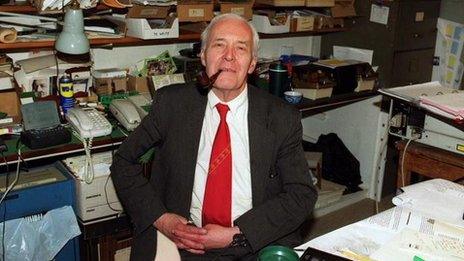Tony Benn: His views on socialism, Europe, war and writing
- Published

Mr Benn was frequently at odds with others in his party
Tony Benn, who has died aged 88, was one of the most distinctive political figures of the past 60 years.
His views on the economy, Europe and foreign wars put him at odds with the political establishment and many within Labour, his own party.
Here Tony Benn, in his own words, explains what he believed in.
"I am an example of someone who moved to the left as I got older. I have known many people who were very left-wing when they were young who ended up as Conservatives. But the experience of government made me realise that Labour was not engaged, as it said it was, in changing society but to make people change to get used to the society we had." On his relationship with his party
Tony Benn: "I'm not not afraid of dying at all"
"My mother once said to me that all decisions, including political decisions, are basically moral. Is it right or wrong? And when a new issue comes up, you have to ask yourself, 'If we do this, is it going to be right or wrong'? On his political philosophy
"We are paying a heavy political price for 20 years in which, as a party, we have played down our criticism of capitalism and soft-pedalled our advocacy of socialism." On socialism
"When people get frightened, they very often turn to the right to give themselves reassurance, and that is why it has always happened in all great economic crises." On 2008 financial crisis
"The real division in society is between those who create the wealth by working and those who own the wealth. Those who own the wealth have far too much power and they use it to control those who create the wealth." On capitalism and inequality
"To be embarrassed by socialism was very much a characteristic of New Labour." On Tony Blair and New Labour
Tony Benn: My political career
"It was true there were great debates in the party. I got the blame for a lot of them but, in fact, the SDP [Social Democratic Party] was formed by Labour people leaving the party so I would not accept responsibility for that." On Labour splits in the 1970s and 1980s
"Have you ever heard Roy Jenkins described as the man who destroyed the Labour Party? It is only when you speak for a certain point of view that that argument is used. The truth is that people who come up with ideas that are unacceptable to the leadership are always denounced." On clash with SDP's 'Gang of Four'
"All war represents a failure of diplomacy. I opposed the Suez war, I opposed the Falklands war. I opposed the Libyan bombing and I opposed the Gulf war, and I never believed that any of those principled arguments lost a single vote - indeed, I think they gained support, though that was not why you did it." On anti-war beliefs
"Undoubtedly the war with Iraq was a tragedy. I think it was also a crime." On Iraq War
"Britain's continuing membership of the [European] Community would mean the end of Britain as a completely self-governing nation." On joining the European Community
Mr Benn championed state control of industry
"My view of the EU has always been not that I am hostile to foreigners but I am in favour of democracy. I think they are building an empire and want us to be part of that empire, and I don't want that." On leaving the European Community
"When I saw how the European Union was developing, it was very obvious what they had in mind was not democratic. In Britain, you vote for a government so the government has to listen to you, and if you don't like it you can change it." On democracy in Europe
"The people who have sacrificed their view in order to get to the top have very often left no footprints in the sands of time." On his leadership ambitions
"The motivation was always the same - to keep a record of what was happening, what was being done, who was saying what, what it meant and what I should do, and I think that is a useful discipline." On writing
"If you find me in the diary occasionally doubting what I believe in, that is part of the self-critical process." On voicing self-doubts in his diaries
"I worked very hard for 52 years. It is a very hard job because you have to be available to everybody all the time. You are employed by the people who vote for you. In my constituency, everyone I met was my employer." On being an MP
- Published14 March 2014
- Published14 March 2014